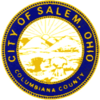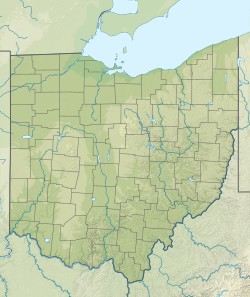|
Salem, Ohio
Salem is a city in northern Columbiana County, Ohio, United States. The population was 11,915 at the 2020 census.[5] It extends into southern Mahoning County and is the principal city of the Salem micropolitan area.[6] Salem was founded by Quakers in 1806 and played a key role in the abolitionist movement as a hub of the Underground Railroad. Once an industrial town, Salem is now a commuter town and regional economic center, home to Allegheny Wesleyan College and Kent State University at Salem. History Salem was founded by a New Jersey clockmaker, Zadok Street, and a Pennsylvanian potter, John Straughan, in 1806. The city was named after Salem, New Jersey, Street's native community. The name Salem itself is a biblical derivative of Jerusalem in the Middle East, which means "city of peace".[7] The city's early settlers included the Religious Society of Friends, also known as Quakers, which the local school district's sports teams honor by referring to themselves collectively as the Salem Quakers.[8][9] Salem was incorporated in 1830.[10] Radio DJ Alan Freed was born in Johnstown, Pennsylvania, and grew up in Salem. While working at a radio station in Cleveland, he coined the phrase "Rock & Roll".[11] Advantageously located between Cleveland and Pittsburgh, Salem thrived on an industrial-based economy. For several decades, Salem's largest corporations included American Standard Brands, Eljer, Mullins Manufacturing,[12] Deming Pump, and Salem China. Today, American Standard, a Fresh Mark, Inc meat production facility,[13] and several tool-and-die manufacturers remain. Reform effortsSalem was a center for reform activity in several ways. The Anti-Slavery Bugle, an abolitionist newspaper, was published in Salem beginning in 1845.[14] A local group of the Progressive Friends, an association of Quakers who separated from the main body partly to be freer to work for such causes as abolitionism and women's rights, formed in Salem in 1849.[15] The local school board at that time was composed entirely of abolitionists.[16] Salem was the site of an annual conference, the Anti-Slavery Fair, whose purpose was to raise money for anti-slavery activities.[17] In April 1850, Salem hosted the first Women's Rights Convention in Ohio, the third such convention in the United States. (The first was the Seneca Falls Convention of 1848; the second was the Rochester Convention two weeks later.) The Salem Convention was the first of these conventions to be organized on a statewide basis.[18] All the convention officers were women. Men were not allowed to vote, sit on the platform, or speak during the convention. The male spectators were supportive, however, and when the convention was over, they created an organization of their own and endorsed the actions of the women's convention.[19] GeographySalem is located about 18 miles (29 km) southwest of Youngstown, 28 miles (45 km) east of Canton, and 60 miles (97 km) southeast of Cleveland. According to the United States Census Bureau, the city has an area of 6.43 square miles (16.65 km2), all land.[20] Salem is the largest incorporated place by area in Columbiana County. The city is mostly surrounded by unincorporated Perry Township. Salem has annexed portions of Perry Township.[21][22][23] Several acres of Salem Township and Green Township were annexed into the city limits in 2000 and 2001. Other actions to spur economic development undertaken around the same time annexed specific land: in 1999, 82.24 acres (332,800 m2) of Salem Township were granted police and fire protection, snow removal service, and other city services.[24] Demographics
2010 censusAs of the census[28] of 2010, there were 12,303 people, 5,272 households, and 3,118 families living in the city. The population density was 1,913.4 inhabitants per square mile (738.8/km2). There were 5,763 housing units at an average density of 896.3 per square mile (346.1/km2). The racial makeup of the city was 95.9% White, 0.7% African American, 0.2% Native American, 0.4% Asian, 1.6% from other races, and 1.2% from two or more races. Hispanic or Latino of any race were 2.5% of the population. There were 5,272 households, of which 26.3% had children under the age of 18 living with them, 41.5% were married couples living together, 12.3% had a female householder with no husband present, 5.3% had a male householder with no wife present, and 40.9% were non-families. 34.9% of all households were made up of individuals, and 15.9% had someone living alone who was 65 years of age or older. The average household size was 2.25 and the average family size was 2.87. The median age in the city was 42.8 years. 21.2% of residents were under the age of 18; 7.7% were between the ages of 18 and 24; 23.6% were from 25 to 44; 28.3% were from 45 to 64; and 19.1% were 65 years of age or older. The gender makeup of the city was 47.9% male and 52.1% female. 2000 censusAs of the census[4] of 2000, there were 12,197 people, 5,146 households, and 3,247 families living in the city. The population density was 2,228.2 people per square mile (860.3 people/km2). There were 5,505 housing units at an average density of 1,005.7 per square mile (388.3/km2). The racial makeup of the city was 98.35% White, 0.52% African American, 0.09% Native American, 0.34% Asian, 0.02% Pacific Islander, 0.08% from other races, and 0.59% from two or more races. Hispanic or Latino of any race were 0.54% of the population. There were 5,146 households, out of which 28.1% had children under the age of 18 living with them, 48.7% were married couples living together, 10.6% had a female householder with no husband present, and 36.9% were non-families. 32.8% of all households were made up of individuals, and 17.1% had someone living alone who was 65 years of age or older. The average household size was 2.31 and the average family size was 2.92. In the city the population was spread out, with 22.8% under the age of 18, 8.1% from 18 to 24, 27.4% from 25 to 44, 21.6% from 45 to 64, and 20.1% who were 65 years of age or older. The median age was 40 years. For every 100 females, there were 84.9 males. For every 100 females age 18 and over, there were 81.0 males. The median income for a household in the city was $30,006, and the median income for a family was $40,191. Males had a median income of $31,630 versus $19,471 for females. The per capita income for the city was $16,579. About 9.8% of families and 11.7% of the population were below the poverty line, including 17.9% of those under age 18 and 9.8% of those age 65 or over. Economy According to the Sustainable Opportunity Development Center in Salem,[29] as of 2022, the top employers in the city are:
Arts and cultureTwo sections of the city are designated National Register historic districts: the South Lincoln Avenue Historic District (designated 1993) and the Salem Downtown Historic District (designated 1995), which includes several of the town's monumental and architecturally distinctive homes and businesses. Other city properties listed on the National Register of Historic Places include the Burchfield Homestead, home to painter Charles E. Burchfield from ages 5 to 28, the John Street House and Daniel Howell Hise House, both Underground Railroad stations, and the First United Methodist Church. GovernmentSalem operates under a chartered mayor–council government. Eight council members are elected as a legislature for two-year terms, which constitutes four separate wards, three at-large districts, and a council president.[30] An independently elected mayor serves as an executive.[30] As of 2024, the mayor is Cyndi Baronzzi Dickey (R) and the council president is Sara Baronzzi (R).[31][32] The mayor, auditor, treasurer, and law director are all elected to four-year terms. Education Primary and secondarySalem is served by the Salem City School District. The schools operated by the district are Buckeye Elementary School (grades K-2), Reilly Elementary School (grades 3–4), Southeast Elementary School (grades 5–6), Salem Junior High School (grades 7–8), and Salem Senior High School (grades 9–12).[a] The Roman Catholic Diocese of Youngstown operates the private St. Paul Elementary School for grades K-6. PostsecondaryAllegheny Wesleyan College is a private, four-year liberal arts college in Salem that grants bachelor's and associate degrees in ministry and theology-related disciplines.[34][35] Kent State University operates a satellite campus, Kent State University at Salem, with one building in the city proper and another just outside the city limits in Salem Township. The campus grants associate's degrees and bachelor's degrees, and also offers introductory programs that can be completed at the main campus. TransportationThe following highways pass through Salem: Notable people
See alsoNotesReferences
External linksWikimedia Commons has media related to Salem, Ohio.
|
||||||||||||||||||||||||||||||||||||||||||||||||||||||||||||||||||||||||||||||||||||||||||||||||||||||||||||||||||||||||||||||||||||||||||||||||||||||||||||||||||||







